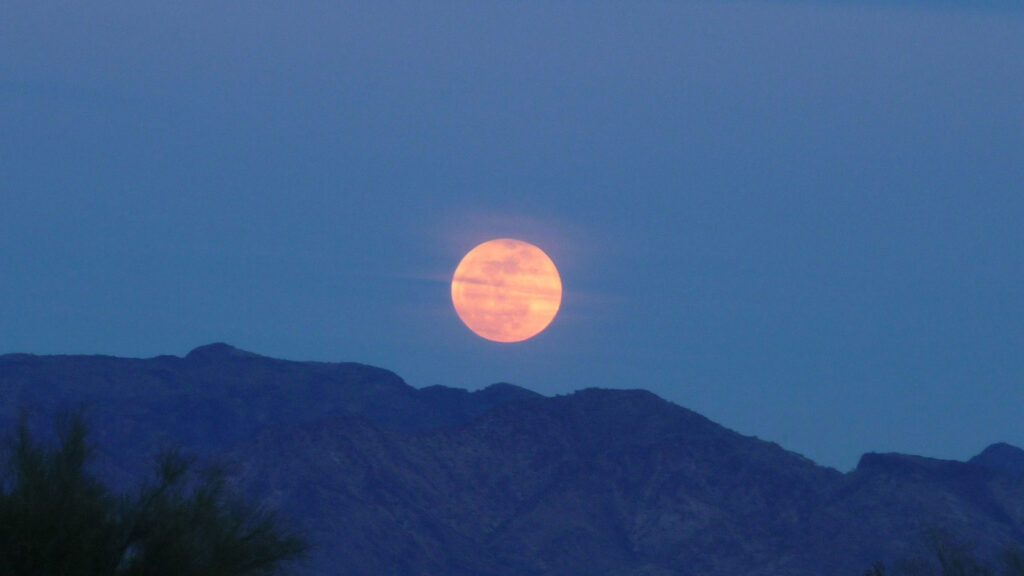
On Saturday, Feb. 24th, the “Snow Moon” will appear in sky at 7:30 a.m. (1)
We’ve all heard the stories about full moons and werewolves. While these old legends are mostly bogus (we hope), there is some scientific evidence that the moon’s phase can impact our behavior, and more specifically, our sleep. So, what is this snow moon and how will it affect us?
First, What Is a Snow Moon?
The Snow Moon is the last full moon of this winter season, and only full moon in the month of February. Also historically known as the Hunger Moon (1) because of its association with the lack of food in the snowy month of February.
Fun fact: this year, the Snow Moon is also called the “minimoon” (not to be confused with the shortened honeymoon trend) because it appears smaller in the sky (2) due to its increased distance from the earth.
Though the snow moon is slightly smaller than usual, it may not appear to be less bright. If you live in an area with snowfall, you might notice the light from the Snow Moon might be even brighter (3), due to the snow’s ability to reflect light.
What Does This Mean For Our Sleep?
What does that mean for us? A few studies have looked into the link between the lunar cycle and sleep. One from 2013, in particular, found that total sleep time was decreased by 20 minutes around a full moon (4).
Interestingly, the study author Dr. Christain Cajochen explained in an interview with SciNews, “the lunar cycle seems to influence human sleep, even when one does not ‘see’ the Moon and is not aware of the actual moon phase.” (5) So, it seems that the visible moonlight wasn’t to blame for the study participants’ sleep disruptions.
Another study looked at the impact of moonlight on sleep patterns in both rural and urban areas, finding that people living in both areas had sleep impacts from the full moon. (6) Research lead Dr. Horacio de la Iglesia explained to the University of Washington News, “‘We see a clear lunar modulation of sleep, with sleep decreasing and a later onset of sleep in the days preceding a full moon’”. (7)
Sleep Tips For This Year’s Snow Moon
If you notice that the moonlight is bothering you, close those curtains or grab an eye mask to make sure the snow moon’s beautiful reflection doesn’t keep you from getting your beauty sleep. And, practicing good sleep hygiene, such as limiting caffeine and alcohol consumption, won’t hurt.
Don’t fret too much about the snow moon’s potential impacts on your sleep. If you’re lucky enough to have a clear sky this weekend, take a peek out your window to catch a glimpse of the last full moon of the winter.
Sources
- Rao, James. “Full moon names for 2024 (and how they came to be)”. Space.com. January 18, 2024. https://www.space.com/39238-full-moon-names.html
- Emspak, Jesse. “February full moon 2024: The Snow Moon rises as a ‘minimoon’ on Feb. 24” Space.com. February 15, 2024. https://www.space.com/35627-february-full-moon.html
- Goss, John Jardine. February full moon is the smallest of 2024. EarthSky. February 23, 2024. https://earthsky.org/tonight/february-full-moon/
- Cajochen, Christian et al. “Evidence that the lunar cycle influences human sleep.” Current biology : CB vol. 23,15 (2013): 1485-8. doi:10.1016/j.cub.2013.06.029
- Sci News. Full Moon Can Disturb Human Sleep, New Research Shows. July 26, 2013. https://www.sci.news/othersciences/anthropology/science-full-moon-disturb-human-sleep-01264.html
- Casiraghi, Leandro et al. “Moonstruck sleep: Synchronization of human sleep with the moon cycle under field conditions.” Science advances vol. 7,5 eabe0465. 27 Jan. 2021, doi:10.1126/sciadv.abe0465
- Urton, James. “On nights before a full moon, people go to bed later and sleep less, study shows”. UW News. January 27, 2021. https://www.washington.edu/news/2021/01/27/moon-sleep/




























